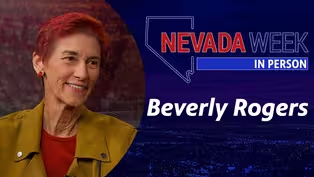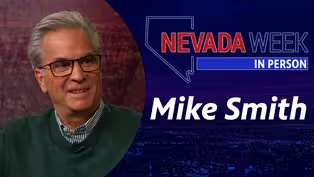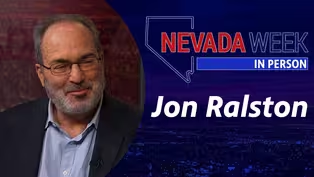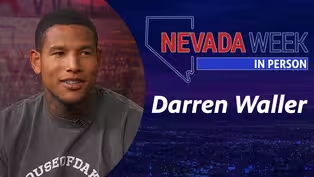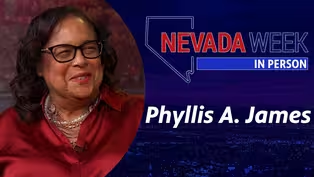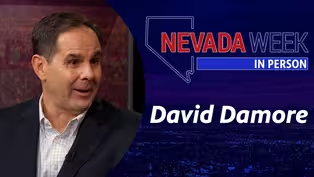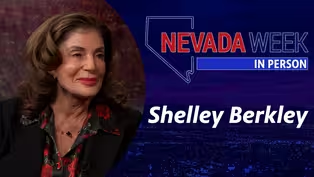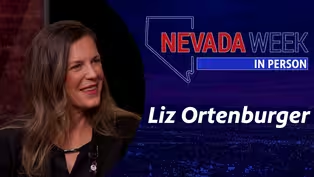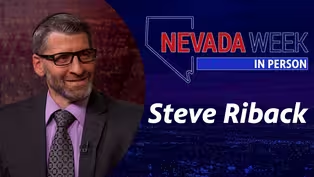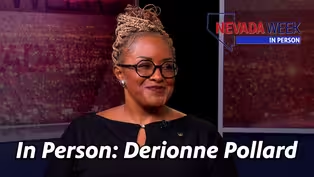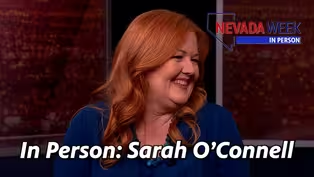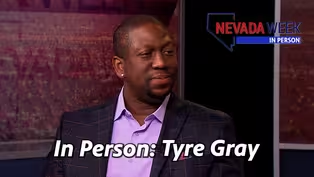
Nevada Week In Person | Kelly Maxwell
Season 1 Episode 42 | 14mVideo has Closed Captions
One-on-one interview with Baby’s Bounty Executive Director Kelly Maxwell.
One-on-one interview with Baby’s Bounty Executive Director Kelly Maxwell.
Problems playing video? | Closed Captioning Feedback
Problems playing video? | Closed Captioning Feedback
Nevada Week In Person is a local public television program presented by Vegas PBS

Nevada Week In Person | Kelly Maxwell
Season 1 Episode 42 | 14mVideo has Closed Captions
One-on-one interview with Baby’s Bounty Executive Director Kelly Maxwell.
Problems playing video? | Closed Captioning Feedback
How to Watch Nevada Week In Person
Nevada Week In Person is available to stream on pbs.org and the free PBS App, available on iPhone, Apple TV, Android TV, Android smartphones, Amazon Fire TV, Amazon Fire Tablet, Roku, Samsung Smart TV, and Vizio.
Providing Support for PBS.org
Learn Moreabout PBS online sponsorshipMore from This Collection
Nevada Week In Person goes beyond the roundtable discussion of Nevada Week with guests for a more casual conversation about their personal passions, new projects and compelling stories that are overlooked in the flurry of the news cycle.
Nevada Week In Person | Beverly Rogers
Video has Closed Captions
One-on-one interview with Rogers Foundation chair Beverly Rogers. (14m)
Nevada Week In Person | Mike Smith
Video has Closed Captions
One-on-one interview with Las Vegas Sun political cartoonist Mike Smith. (14m)
Nevada Week In Person | Jon Ralston
Video has Closed Captions
One-on-one interview with The Nevada Independent CEO Jon Ralston. (14m)
Nevada Week In Person | Darren Waller
Video has Closed Captions
One-on-one interview with Las Vegas Raider tight end Darren Waller. (14m)
Nevada Week In Person | Phyllis A. James
Video has Closed Captions
One-on-one interview Phyllis A. James. (14m)
Nevada Week In Person | David Damore
Video has Closed Captions
One-on-one interview with Chair of the Department of Political Science at UNLV David Damor (14m)
Nevada Week In Person | Shelley Berkley
Video has Closed Captions
One-on-one interview Senior Vice President for Touro University Shelley Berkley. (14m)
Nevada Week In Person | Liz Ortenburger
Video has Closed Captions
One-on-one interview with SafeNest CEO Liz Ortenburger. (14m)
Nevada Week In Person | Steve Riback
Video has Closed Captions
One-on-one interview with Las Vegas Metro Police Lieutenant Steve Riback. (14m)
Nevada Week In Person | DeRionne Pollard
Video has Closed Captions
One-on-one interview Nevada State College President DeRionne Pollard. (14m)
Nevada Week In Person | Sarah O’Connell
Video has Closed Captions
One-on-one interview with Director of Eat More Art LLC Sarah O’Connell. (14m)
Nevada Week In Person | Tyre Gray
Video has Closed Captions
One-on-one interview with Nevada Mining Association President Tyre Gray. (14m 1s)
Providing Support for PBS.org
Learn Moreabout PBS online sponsorshipWith a personal mission of solving Southern Nevada's diaper need by 2025, Las Vegas native and Executive Director of Baby's Bounty, Kelly Maxwell joins us this week for Nevada Week In Person.
♪♪♪ Support for Nevada Week In Person is provided by Senator William H. Hernstadt.
-Welcome to Nevada Week In Person.
I'm Amber Renee Dixon.
As proclaimed by the City of Las Vegas and the governor of Nevada, Baby's Bounty is the only consistent diaper resource in all of Southern Nevada.
Kelly Maxwell leads the 13-year-old local nonprofit which works to ensure a good start for every baby.
And this year, the governor appointed her to a statewide Diapering Resource Committee.
Kelly Maxwell, thank you for joining us for Nevada Week.
(Kelly Maxwell) Thank you for having me.
Thank you.
-A statewide Diapering Resource Committee.
What does it do, and what do you do for it?
-Sure.
So we're working very hard to solve diaper need here in Southern Nevada, in fact, for the entire state, but our focus right now is in Southern Nevada.
So I work with a team of wonderful professionals, largely from the medical field and also some from public service, trying to acquire the resources to provide diapers to families living in poverty.
-How do you go about doing that?
-Well, we're working on the policy side in the Diaper Resource Committee.
But in my nonprofit, we are working practically with product and actually hosting our own diaper banks so we can get those diapers in the hands of the folks who need them immediately.
-From that statewide committee perspective and the policy, how can you change policy to ensure access to diapers?
-One of the things we're working on is removing the sales tax on diapers.
So it's a long process through the Nevada legislature, but we're working on that now so that at least that can sort of balance the inflationary increases that we've seen.
-The fact that there is a committee for this speaks to how important it is to have access to diapers, but what do you tell people who may not understand?
-Well, a third of families experience diaper need, and that's a national study.
Diapers are preventative health care supplies.
I think they're an often overlooked component of poverty.
We think about poverty kind of myopically sometimes.
We think about rent, we think about utilities, maybe Internet access, transportation, but we sometimes forget about essentials, like diapers.
So not only are they preventative medical care, but they're also a component to getting our economy back on track.
So if clients don't have the diapers that they need to send their children to daycare, they can't get to work, they can't get to school.
So we're trying to fill that gap.
There are no-- There's no federal safety net for diapers.
So there's SNAP benefits for food.
You can't purchase diapers with those benefits.
-And if you are taking your child to daycare, you have to bring those diapers yourself?
-You do, eight to ten diapers per day.
And even some of the free and subsidized daycares don't provide a full day's supply of diapers.
-So if you are going to solve the diaper need in Southern Nevada by 2025, how do you go about doing that?
-We're well on our way.
We're currently providing diapers for over 1,000 families per month with recurring diaper banks in Las Vegas, North Las Vegas, and often in Henderson as well.
We also host pop-up diaper banks throughout the valley.
We recently acquired a brand new Ford Transit cargo van, which will launch next month as our mobile diaper bank.
So we will get that out into rural Clark County to areas that, you know, just-- They're diaper deserts, basically.
They can't get to our diaper banks; it's a two hour bus ride.
So we're going to take that diaper bank out into these communities and really promote these micro banks where folks can come, they can access the diapers.
And we're also expanding to Reno.
There's a diaper desert there as well, and we've been asked to expand our services there.
We're really trying to plan strategically to focus on the areas of greatest need.
And I think, you know, solving diaper need looks like any family living in poverty will have access to the diapering resources that they need to keep their children clean, healthy, and dry.
-These recurring diaper banks that you spoke about locally, you were able to launch those amid the pandemic when you just first took on this role.
How did you do that?
-We did.
So how it actually happened is that we were running our other program, which was a 12-year-old program, our Baby Bundle program.
Folks really thought of us when they thought of baby supplies.
Clients were calling us at the onset of the pandemic saying, We can't find diapers on the shelves.
People are hoarding them like they're hoarding toilet paper.
We don't know what to do.
We had a stock of diapers.
Not an enormous quantity, but we had some.
So we said, you know, Come here, we'll make you an emergency pack.
Word got out that we had diapers, and we were distributing about 60 emergency packs a week.
And it wasn't sustainable for our organization.
So I started calling around to find a resource for our clients, thinking there must be a diaper bank in a city of this size.
And actually, there wasn't, which was shocking to me.
In fact, there wasn't a consistent diaper resource in the state of Nevada.
So we did it.
We just said, let's do it.
There's a need here.
Let's launch it.
And we reached out to one of our sponsors who generously said, Here's $10,000.
Go get it.
We launched our first diaper bank in the parking lot of Valley High School on May 20 of 2020.
We served 63 families that day.
And next month, we will distribute our 2 millionth diaper, 4.3 million wipes to over 28,000 of Southern Nevada's tiniest residents.
-Congratulations on that.
-Thank you.
-Back to that deadline of 2025.
Why 2025?
-You know, I actually think we're going to outperform that.
I think we're going to meet that goal sooner.
I think actually, we'll get it by 2024.
But I wanted to give us a little time.
Diaper need is, you know, 1 in 3, right?
So it's a huge need in our community.
So I wanted to give us a little time to expand.
It's a huge state, and we know that the metropolitan areas are separated by vast areas, vast rural areas, right?
So how we're working is throughout Southern Nevada in the key areas.
Our mobile diaper bank will also have a static bank in Reno and a mobile diaper bank operating out of there as well.
-Isn't this an issue, though, that cannot have a deadline?
I mean, it's going to continue after 2025, the need.
-Right.
Well, as long as we know that any family in need can reach out to us, come to our recurring diaper banks, access our services at any time they need.
That is what diaper need looks like, right?
You need the resources, and the services are available and provided by us.
-What is the best way someone watching can help Baby's Bounty?
-Sure.
We have a lot of opportunities.
If folks need help, first of all, they should log on to our website, find out about our diaper banks.
It's very easy to register.
We make it a really easy process.
We want clients to access our service.
We want to say yes.
We want them to come in and get the items we need.
There's no judgment.
There's very little qualifications required.
We just want them-- If you need diapers and you have a child in need, please come and access those services.
For folks who want to help us, they can always donate on our website.
We purchase diapers at wholesale pricing, so cash donations go further.
Some people don't like to donate cash, and that's great.
They can always donate new unopened diapers at our distribution center.
And all of that's available on our website.
And folks can volunteer.
So we have a link on our website where folks can come out and volunteer at our diaper banks.
There's really no substitute for coming out and meeting the clients and seeing the gratitude and the relief on the faces of the families.
That really is why we do it every day.
-I read a story where one family that was in need ended up coming back and helping later when they were able to.
What has the impact of inflation been on Baby's Bounty?
-So depending on brand, diapers went up between 14 and 83% since COVID hit.
So huge impact financially.
And with our Baby Bundle program, we've seen huge inflationary increases.
We buy about 75 car seats per month that we distribute in that program.
They've gone up 40%.
So we are working very hard to fundraise and grant write to make up that difference.
-Wow.
And what is part of those babies' bundles?
-Oh, so the Baby Bundle program is amazing.
Basically, we provide all of the items needed to care for a newborn for the first six months of life: brand new crib, brand new car seat, 25 items of clothing, Safe Sleep kit, bibs, rattles, baby books, diapers, wipes, toiletry kits.
It's basically a baby shower in a bag.
But our clients living in poverty don't often have family and friends that can throw them a proper baby shower.
So we're really all in alignment with meeting that mission of providing a good start for every baby.
-How big of a need is that in Southern Nevada?
-We're distributing about 75 of those per month.
8,600 - 8,700 since our inception.
That's a program that's a larger impact but a smaller number of clients; whereas, our diaper banks are, you know, reaching 15,000 clients a year.
-And if they weren't able to have access to this, there would be newborns leaving the hospital without essential products?
-Yes.
You can't leave the hospital without a car seat.
But our clients will often borrow car seats, you know, unsafe, and then give them back, right?
They'll use car seats that aren't appropriate for the size and the weight of the child.
We have heard from our clients that without the products that we provide, they would be sleeping their children in a bed with another child, in bed with the parents, on a bath mat.
We've heard it all.
So we know for certain that these products that we provide, in concert with the education component that we also require, we are preventing infant death and injury by making sure that they understand the basics of safe sleep.
-The recipients have to go through some education?
-They do.
-Okay.
-It is actually free on our website for anyone to take.
So if anyone's interested in learning more about safe sleep and baby basics, they can log on and do that.
But it is required of our Bundle clients.
-Well, October is Safe Sleep and SIDS Awareness Month.
What is SIDS, and how prevalent is it still?
-Sure.
Sudden Infant Death Syndrome.
Very dangerous.
What we know for sure is that at least two infants in Southern Nevada are lost each month to unsafe sleep environments.
So we're working very hard to solve that need to make sure that these clients have both the tools and the education to properly sleep their infants.
What we focus on is the ABCs of sleep: alone, the baby needs to be sleeping alone; on its back; and in a crib.
Those are the-- Those are the basics.
But if they want to learn more, please log on to the website and take the course.
-And inside the crib itself, what should there be?
-No items whatsoever.
No blankets, no toys, no lovies-- just the baby and in a climate-appropriate outfit.
-Why does this issue impact certain people of color more than other demographics?
-Well, the clients who we serve are largely, they largely identify as ethnic minorities, and they're largely living below the poverty line.
So 130% of the federal poverty guidelines.
So it's really more about the poverty than necessarily the minority status, but those things are often a proxy for one another.
And we know for certain that these clients are not getting the proper education in the hospital because of, you know, health disparities.
We know those things.
We also know that often their poverty level precludes them from being able to afford the proper tools.
So we're trying to bridge that gap.
-Last question for you.
You made the transition.
This is your first not-for-profit job.
So coming from this sector for profit to nonprofit, what was that transition like?
-Well, it was very unexpected for me.
It was not part of my plan.
I had worked in hospitality.
Right before Baby's Bounty, I was the COO of a ticketing company.
This sort of came out of nowhere, but I was on the Board for six years and was asked to step in.
And I said no eight or nine times; and then after a while, I stepped in.
And I really thought I was doing them a favor by sort of bringing my for-profit management and leadership to the organization; but as it turned out, the honor is all mine.
And this has been the greatest honor of my lifetime, to lead an organization that's had such a positive impact in our community.
-Kelly Maxwell, Baby's Bounty, thank you so much for your time.
And thank you for joining us for Nevada Week In Person.
To see more of Nevada Week In Person, visit vegaspbs.org/nevadaweek.
♪♪♪

- News and Public Affairs

Top journalists deliver compelling original analysis of the hour's headlines.

- News and Public Affairs

FRONTLINE is investigative journalism that questions, explains and changes our world.












Support for PBS provided by:
Nevada Week In Person is a local public television program presented by Vegas PBS
